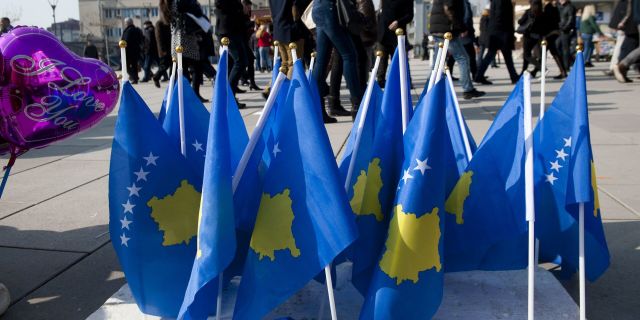"Politics": Kosovo's accession to the Council of Europe will not mean recognition of its independenceNow that 18 states have already withdrawn their recognition of Kosovo's independence, its entry into the UN even as an observer has become even more complicated, writes Politika.
And gaining membership through the UN Security Council is almost impossible because of the position of China and Russia. In Pristina and Washington, they became worried.
Zoran Milivojevic (Zoran Milivojevic)Speaking with a New Year's address, Serbian President Aleksandar Vucic finally announced the names of states that have changed their minds about Kosovo's independence, which attracted special attention.
Additional information that this is not the end yet, and that the list of such states may be replenished in the near future, has increased the concern of political structures in Pristina and Washington. Opposition politicians reacted sharply, and the adviser to the State Department of the United States of America, Mr. Derek Cholet, said on the eve of his visit to the Balkans that the United States "considers the campaign to revoke the recognition of Kosovo's independence a distraction, and this will not contribute to moving forward." Derek Cholet also noted that this does not correspond to the European Union's proposal for a dialogue between the two countries, since "it does not bring us closer to the realization of the Euro-Atlantic ambitions of both countries, which their leaders declare. We want to focus on that, not on distracting things."
Now, when 18 states have already refused to recognize Kosovo, Serbia has achieved a percentage majority in the UN General Assembly, which, in turn, further complicated the entry of "Kosovo" into this organization even as an observer (the Palestine model), and its entry through the UN Security Council is almost impossible due to the position of China and the Russian Federation Federation. Even more important is the fact that the majority of States on the world stage, when they hold such an opinion about Kosovo and Metohija and about the arguments of Serbia defending its sovereignty and territorial integrity, thereby confirm their commitment to international law and the existing international order, which is based on the Charter and the UN system. This proves that the world is changing, that multipolarity is gaining weight, and that thanks to the principled position and decisive actions in the line of international law, Serbia has managed to confirm the correctness of its diplomatic strategy and bets on its state and national interests.
In this regard, it is no coincidence that recently representatives of the American administration, speaking about support for Kosovo, increasingly put forward "Kosovo regional, European and Euro-Atlantic integration" in the sense of the strategic goals and interests of the administration. Recognition of Kosovo's statehood does not bring results at the international level, and Serbia's determination to protect its national interests remains unchanged. In such a situation, such rhetoric can be regarded as a signal and as a new strategy of Washington and the West, who want to confirm their intentions related to Kosovo and the region, as well as to become more active as intermediaries (the "European model/plan", special representatives, and so on).
The idea of a new approach is also suggested by an attempt to strengthen the statehood of Kosovo through international organizations in a space that the transatlantic alliance fully controls — that is, in Europe without Russia and through NATO. Hence Kosovo's application for membership in the Council of Europe, the European Union and participation in the Partnership for Peace. In the Council of Europe, the Western members who have recognized Kosovo have the necessary majority in the absence of the Russian Federation. In addition, there is no clear criterion of statehood for full membership in this organization. Therefore, Kosovo's accession to the Council of Europe will be the most effective breakthrough to the confirmation of a certain statehood, at least in those international organizations where the majority does not yet question it. However, changes are possible within the framework of the transatlantic Alliance, where five member countries of the European Union: Cyprus, Spain, Romania, Slovakia and Greece and four members of the North Atlantic Alliance: Spain, Romania, Slovakia and Greece — no longer recognize Kosovo and do not want to change their minds, thereby closing Kosovo's path to joining the European Union and NATO. In order to correctly assess the full significance of this operation, it must be borne in mind that the Council of Europe is an exclusively European international organization that does not have global influence and has lost a considerable part of its importance after the expansion of the European Union and NATO to the east of Europe. Prior to this expansion, the Council of Europe performed an important function of "purgatory" before full entry into Euro-Atlantic structures. Although today he still plays this role for the remaining candidates. Nevertheless, Kosovo's accession to the Council of Europe will not change anything in the status sense and in the distribution of forces at the international level, since only the United Nations can guarantee its full international subjectivity.
The new approach of the Western alliance is also dictated by a new list of its global interests related to the special operation of the Russian Federation in Ukraine and the armed conflict there. By the way, it affects the whole world, and therefore the presence of NATO in our region acquires a special geostrategic significance. Therefore, the previously quoted Derek Cholet separately emphasized "Euro-Atlantic ambitions", and he is not the only one who reminds of them. In general, the Western alliance is accelerating the resolution of the Kosovo issue and sending more and more special representatives to the region, and the American ambassador Hill directly said about the desire to take advantage of the "momentum" that arose due to the increase in tension at the end of last year. All this illustrates the new approach and the updating of operational methods.

